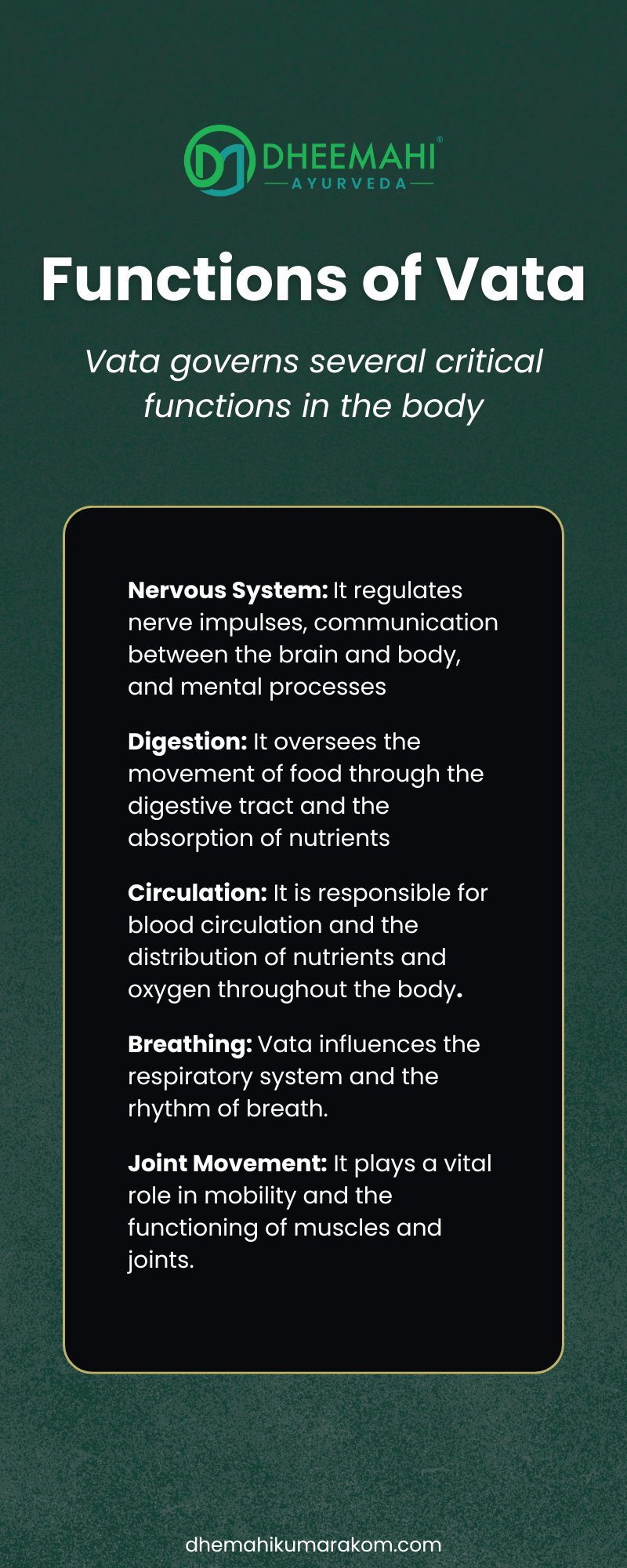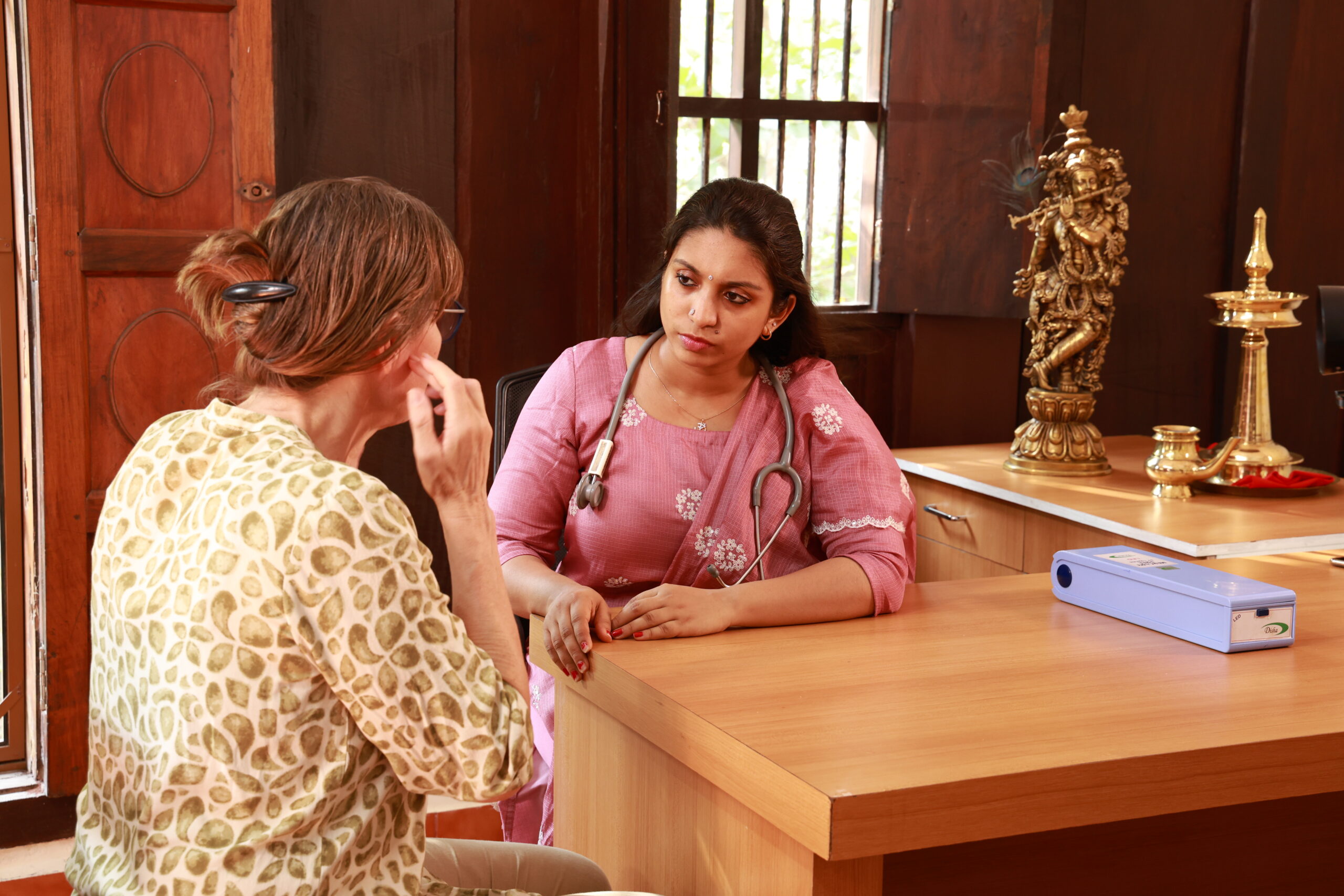Everything to know about Vata Dosha
Dr. Athul
Introduction
In Ayurveda, the five natural elements—ether, air, fire, water, and earth—are reflected in both the mind and body through the three doshas: Vata (ether and air), Pitta (fire and water), and Kapha (water and earth).
These elemental energies shape various aspects of our being, including our physical characteristics, digestive functions, and how we process thoughts and emotions.
Understanding Vata dosha is essential for maintaining overall health and well-being.
By recognizing its characteristics, functions, and signs of imbalance, individuals can take proactive steps to restore balance through dietary choices, lifestyle adjustments, and mindfulness practices.
What is Vata Dosha
Vata dosha is the Ayurvedic mind-body element linked to air and space. Characterized as light, cool, and dry, Vata governs all forms of movement and processes within the body and mind. This includes functions such as blood circulation, elimination, respiration, and the flow of thoughts.
The primary elements of Vata are:
Air: Represents movement, creativity, and flexibility.
Space (Ether): Provides a framework for movement and the capacity to hold things together.
Types of Vata
Vata can be further categorised into five subtypes, each with specific functions:
Prana Vata: Governs inhalation and the functioning of the mind.
Udana Vata: Controls speech, enthusiasm, and upward movement.
Samana Vata: Responsible for digestion and nutrient absorption.
Apana Vata: Governs elimination processes and reproductive functions.
Vyana Vata: Manages circulation and the distribution of nutrients throughout the body.
Functions of Vata
Vata governs several critical functions in the body:
Nervous System: It regulates nerve impulses, communication between the brain and body, and mental processes.
Digestion: It oversees the movement of food through the digestive tract and the absorption of nutrients.
Circulation: It is responsible for blood circulation and the distribution of nutrients and oxygen throughout the body.
Breathing: Vata influences the respiratory system and the rhythm of breath.
Joint Movement: It plays a vital role in mobility and the functioning of muscles and joints.

Characteristics of Vata Dosha
If you have a predominantly Vata constitution, the qualities of Vata dosha—light, cool, dry, and quick—will be prominently reflected in your mind and body. You may have a naturally slender physique, and your hands and feet might be prone to feeling cold.
Your skin is likely to cool and dry, especially in the extremities, and you may experience occasional difficulties with sleep or disturbances throughout the night.
Intellectually, you possess an agile mind that processes information quickly, though you might also struggle with forgetfulness.
Your emotions tend to be fluid, and those with strong Vata tendencies often exhibit a creative, dynamic personality, frequently feeling rushed or in a hurry.
These are some of the fundamental characteristics of Vata dosha (keep in mind that everyone has some degree of Vata within them)
Signs and Symptoms of Vata Imbalance
Vata in Balance
- Energetic and vivacious
- Learns easily
- Clear and alert mind
- Falls asleep easily at bedtime
- Balanced digestion and elimination
- Good circulation and stable body temperature
Vata Out of Balance
- Tired or fatigued
- Lack of focus or forgetfulness
- Spaced out or scattered
- Difficulty falling asleep
- Occasional constipation, gas, or bloating
- Physical coldness, such as cold hands and feet
- Feelings of anxiety or worry
Signs of Vata Imbalance
An imbalance in Vata can manifest in various physical and psychological symptoms, including:
Physical Symptoms
- Dry Skin and Hair: Lack of moisture can lead to flaky skin and brittle hair.
- Digestive Issues: Symptoms like constipation, gas, and bloating are common.
- Joint Pain: Dryness can lead to stiffness and discomfort in the joints.
- Cold Hands and Feet: Poor circulation may result in cold extremities.
- Weight Loss: Vata imbalances can lead to decreased appetite and weight loss.
Psychological Symptoms
- Anxiety and Fear: Vata imbalance can lead to heightened feelings of anxiety and restlessness.
- Insomnia: Difficulty in falling or staying asleep is common.
- Irregular Mood Swings: Fluctuating emotions and irritability may occur.
- Difficulty Concentrating: A scattered mind can make it challenging to focus on tasks.
Vata Dosha Specific Diet
In Ayurvedic medicine, healthy digestion is considered the cornerstone of overall well-being. It emphasises the importance of consuming foods that balance the dominant dosha.
For individuals with a predominant Vata constitution, it’s beneficial to eat foods that enhance Kapha qualities, such as heaviness, stillness, and smoothness. This helps counteract the coldness and lightness associated with Vata.
Many Vata individuals experience fluctuating and sensitive digestive patterns, often accompanied by variable appetites.
They may skip meals or forget to eat, which can lead to unintended weight loss, as well as issues like gas, bloating, and constipation.
To support digestion, Ayurveda recommends that Vata types choose warm, moist, and heavy foods that are easy to digest.
It’s advisable to avoid cold and raw foods, along with stimulants such as nicotine and caffeine.
Sweet, salty, and sour flavours help balance Vata, while pungent, bitter, and astringent tastes may be aggravating.
A balanced Vata dosha diet might include the following:
Beverages: Buttermilk, warm teas, nut milk, and warm or room-temperature water
Meat and Eggs: Beef, chicken, turkey, and eggs
Grains: Rice, oats, quinoa, and wheat
Fruits: Berries, peaches, mangoes, melons, bananas, avocados, coconuts, and cooked apples
Vegetables: Carrots, beets, squash, lentils, mung beans, sweet potatoes, and green leafy vegetables
Spices: Ginger, basil, bay leaves, cinnamon, nutmeg, cloves, parsley, and turmeric
Nuts and Seeds: Almonds, chestnuts, cashews, pistachios, and sunflower and pumpkin seeds
Oils: Ghee, avocado oil, coconut oil, sesame oil, and extra virgin olive oil
Ayurvedic Treatments for Vata Dosha Imbalance
Abhyanga (Oil Massage):
A warm oil massage using sesame or almond oil nourishes the skin and calms the nervous system.
Shirodhara:
This therapy involves pouring warm oil over the forehead, which helps alleviate anxiety, improve sleep quality, and promote mental clarity.
Basti (Medicated Enema):
A cleansing therapy that focuses on the lower digestive tract is beneficial for addressing constipation and balancing digestive issues.
Seasonal Adjustments
In Ayurveda, it’s essential to adapt to seasonal changes:
Winter: Focus on warm, hearty foods and increase oil and fat intake.
Fall: Emphasize grounding foods and maintain a warm routine.
Dietary Recommendations
Warm, Nourishing Foods:Cooked Grains: Choose rice, oats, and quinoa to provide grounding energy.
Warm Soups and Stews: These are easy to digest and provide hydration.
Healthy Fats: Incorporate ghee, olive oil, and avocado oil to enhance moisture in your diet.
Sweet, Salty, and Sour Tastes: Foods like sweet potatoes, bananas, and cooked apples can help balance Vata.
Foods to Avoid:
Cold and Raw Foods: Minimize salads and uncooked items, as they aggravate Vata’s cool nature.
Stimulants: Reduce caffeine and nicotine intake to prevent anxiety and restlessness.
Lifestyle Modifications
Establish a Routine
Maintaining a consistent daily routine helps ground Vata energies:
- Regular Meal Times: Eating at the same times each day can stabilise digestion and appetite.
- Sleep Schedule: Aim for a regular sleep routine to promote restful sleep.
Gentle Exercise
Engage in calming and grounding activities:
- Yoga and Tai Chi: These practices promote relaxation and physical stability.
- Walking: Gentle walks can help alleviate stress while supporting circulation.
Mindfulness Practices
Incorporating mindfulness can help soothe an agitated mind:
- Meditation: Regular meditation can foster mental clarity and emotional balance.
- Deep Breathing: Breathing exercises can calm the nervous system and reduce feelings of anxiety.
Conclusion
Balancing Vata dosha is essential for achieving overall health and well-being. When Vata is imbalanced, it can lead to issues like anxiety, dry skin, bloating, and irregular sleep. By implementing dietary changes, lifestyle adjustments, herbal remedies, and therapeutic practices, individuals can effectively address Vata imbalances.
Opting for warm, grounding foods, maintaining a regular routine, and practicing calming activities like yoga or meditation are some of the ways to balance Vata.
Visiting an Ayurveda resort in Kerala is an excellent way to experience personalized Vata-balancing treatments.
With guidance from qualified Ayurvedic practitioners, you’ll receive a tailored regimen that may include therapies like Abhyanga (oil massage), Shirodhara, and herbal treatments, all designed to restore balance and vitality.
Embracing these holistic approaches can lead to a more harmonious and fulfilling life, grounded in balance and vitality.
Always consult a qualified Ayurvedic practitioner for personalized recommendations tailored to your unique constitution and needs.
How Our Booking Process Works
The unique approach involves a series of discussion during your initial decision-making process to make sure that we will be able to match your expectations with our treatment.
Based on the discussions with you our team of expert doctors will design the best treatment package personalized for your needs.
01
Consultation Form
Fill out our consultation form, and let us know when will you be available for our doctor to talk to you
02
Discussion with Doctor
Discuss your health condition and expectations with our doctor.
03
Booking Confirmation
Confirm the booking by making a payment of 50% advance.
Consultation Form
Submit this form to initiate a booking with us
Have any queries? We will help you. Talk to us now
Say Goodbye to Health Woes & Hello to Healthy Living
Dheemahi Ayurvedic Pvt Ltd
12/386 Varaputhara Road
Kumarakom, Kerala, India
Pin 686563
Dheemahi Ayurvedic Centre, Near Neelimangalam Bridge, Kumaranaloor, Perumbaikad.P.O, Kottayam, Kerala, India, Pin 686016
Other Treatments
Karkidaka Chikilsa | Ayurvedic Treatment for Depression | How to Reduce Stress Naturally | Autoimmune Disorders | Mental Health Ayurvedic Treatment | Weight-Loss Treatment | Frozen Shoulder Ayurvedic Treatment | Diabetes Ayurvedic Treatment | PCOS Ayurvedic Treatment | Celiac Disease Treatment | ayurvedic treatment for skin diseases | nervous system ayurvedic treatment | Back Pain Ayurvedic Treatment | Cervical Spondylitis Ayurvedic Treatment | ayurvedic treatment for blood sugar | Fatty Liver Ayurvedic Treatment | Knee Pain Ayurvedic Treatment | Migraine Ayurvedic Treatment | Osteoarthritis Ayurvedic Treatment | Psoriasis Ayurvedic Treatment | Sinusitis Ayurvedic Treatment | Ayurvedic Detox Treatment | Migraine Ayurvedic Treatment | Ayurvedic Treatment for Rheumatoid Arthritis | Ayurvedic treatment for joint pain | Ayurvedic treatment for ulcerative colitis | Panchakarma Treatment |

